#the alliance takes a victory group shot and post it on their public media going what would you do if you saw us... ;)
Text


Thoughts about Echoes of Oblivion: I consider Eight to be cosmically insignificant. That he's just a blip in the giant lifeform that is the Force. It doesn't make him any less important than the next character, but he's not some grand savior or even anything next to say, the Hero of Tython. He doesn't even show up on Force radars half the time. This obviously clashes with a major portion of KOTFE/ET and after that keeps trying to make you somebody, but he is literally nobody. The fact that he matters so much to someone like Jadus who is a gigantic presence and galaxy-shaker delights the hell out of me, but it only makes him special to their relationship, not the rest of the world.
To that end, I think not even Arcann would remember him. Senya would still be angry; she deserves to be and they both made and accepted their choice with him as their murderer. He holds nothing against her if she wants him to suffer for the rest of his life. Given the tweaking of his role as Outlander however, I'm unsure of whether Arcann would hold the same grudge. He might, given this nobody killed his entire family-- but Eight barely spoke, and I think Arcann's vitriol is much more directed at an Outlander who... has a presence at all. Eight might have appeared as just an unknown soldier to him. But I suppose even he needed someone to hate, if he could never reach his father. It's hard for me to imagine him doing so for Eight however, as he did promise he'd defeat him in his stead.
Oddly enough, this time Vaylin had no objections compared to a LS playthrough which is very sad given she must have just wanted to be free of her life of pain and misery, so it made me sigh in relief a little. She deserved a bit of catharsis. It's ironic that the path most would assume would heal her made her more overcome with rage. As mentioned before, it's strange how she and Eight sometimes would silently see eye to eye like that. Maybe that's just how those mired in endless violence are.
I also don't think they needed him to be there for this one given a huge chunk of the vital Force-users there were like uh.... we hate this guy for killing us. Made it really awkward.
It's nice to think of Eight as one of those nameless phantoms in the back who show up just to get a good hit in for Valkorion though, and while I don't think he couldn't do such a thing, he's more of the whimsical surprise character who shows up mysteriously out of nowhere to wreak havoc while simultaneously being helpful and acting on his own agenda (Jadus sends his regards!).
It still got me though when Valkorion pulled him to the side alone and asked him if he really did kill his entire family without being controlled-- I was very curious about the point of lying about it, which I imagine would've been good for RP purposes, but Eight would never shirk the responsibility or the weight of his decisions-- his kills. Valkorion laughed and said he must have enjoyed it if he was so steadfast in his conviction, but Eight would never. Not that him or his family could understand, as they've only known emotions that lead to murder their entire lives. The curse of being empaths, I suppose.
Though I had to pick the apology button to Senya, he wouldn't do that either. He didn't do it then. He couldn't do it now, and she knew it was too late for feelings (it always is. at some point you give up on justifications. you accept this as who you are) and so she brushed past him saying his time would come, and Arcann saying he would suffer eventually.
Ironically, he'd never turn that on them had their situations been reversed. Not that the game had any neutral options for this expac, haha.
He probably wished he got to stay outside Satele's head with Theron. There's something symbolic about him finding the loneliest, coldest vistas of Valkorion's barren mind filled with darkness as comforting, like it's the only place in the galaxy where he could ever be. KOTFE/ET... really made it apparent how other people became his hell, when all they could see was a tool for their victory and a bloody knife to blame.
He was oddly happy when Valkorion didn't remember him. He was grateful. Thank the stars. I should wish to be forgotten.
Then the arc tied off with a cheeky nod waking up to the same Lana with a stim like the PC does first leaving carbonite, but it was more bittersweet than anything to once again jet off...somewhere with her knowing Eight's history with the one he deferred to this entire expac. He tiredly went "I don't care," when she asked him where to go next, just the two of them in a shuttle again. No further words were exchanged and we don't know where she picked, but that summarizes their relationship pretty well: being dragged off not even half-awake by Lana without asking lol. He's still her agent even now, huh?
...Though given the garbage fire and lots of dead people that resulted because of their disastrous power dynamic, I could very clearly hear the frantic holocall from Theron ringing 30 minutes later asking where the kriff she's taking him and to put him back right now.
#swtor#kotfe/et au#this storyline makes me so profoundly depressed#also have a lot of thoughts about him and Scourge but that's for another time#given his hatred of the Servants and how ironic it is for the Hand of Jadus to enter the ultimate Best Servant Smackdown#no I'm Valk's favorite! no I am! no me! YOU'RE ALL WRONG....#eight stands in the doorway wearing an oversized JADUS FOR EMPEROR tshirt#anyways there will be no rest for the weapon who gives himself two lifetimes over for a galaxy who continually hates him#the alliance takes a victory group shot and post it on their public media going what would you do if you saw us... ;)#and eight comments killing myself in front of you to change the trajectory of your lives forever. they immediately drag him off to therapy
13 notes
·
View notes
Photo

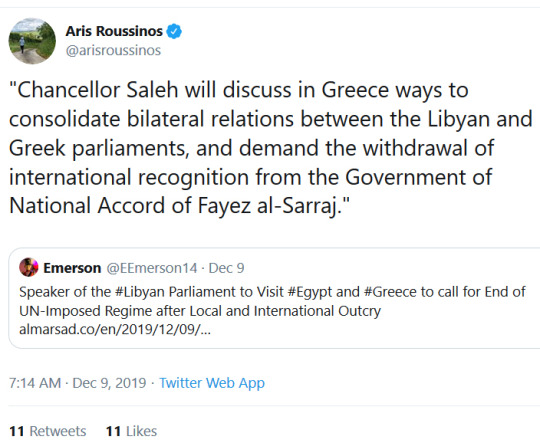
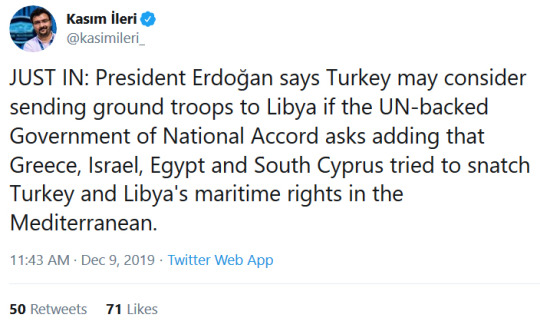
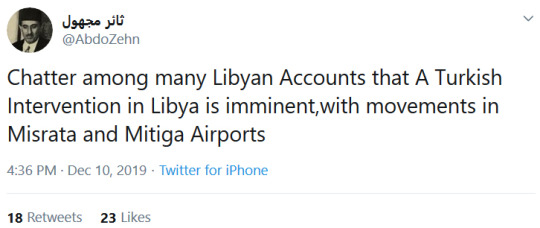
Now that the LNA has been bolstered by Russian mercenary power, things are moving very quickly in Libya. It is now likely for a Greek, Egypt and Russian backed Libyan National Army to face a Turkish intervention on behalf of the failing United Nations and western established Government of National Accord in Tripoli.
>Ok what the fuck does any of this mean, I havent been here long and i only care to smack deh belly and like paper
In 2012, the first election was held in post-gaddafi’s Libya. The General National Congress, or the transitional government, held until 2014. Unsurprisingly, secular and islamist militias began to resent eachother and in some cases, intimidate people from going to the polls. Kidnappings and militia violence became particularly bad in North East Libya, where the LNA would eventually begin it’s war against them and the GNC, because the GNC was turning a blind eye to it (tho likely from the failure of the traditional democracy to produce.. well, any results because more repressive, Islamist laws).
Even more unsurprisingly, the youth and pro-democracy camp were disillusioned and upset to find that no one held their election promises and that some areas like the city of Derna failed to even hold a vote because of the outbreak of Islamist rebellion there and in parts of Benghazi. Only 18% of the people came out to vote that year in August. Subsequently, Islamists and the Islamic Brotherhood lost even more of their share of the Congress, so Misrata based Islamist militias abducted political opponents, raided hundreds of homes and then seized the Tripoli based General National Congress in a coup because they refused to be a minority in the now majority Nationalist and Liberal legislature.
Once Tripoli became dangerous, the new parliament formed without the Islamist factions in Tobruk called the “House of Representatives”, essentially producing a west and eastern Libyan Government. The House of Representatives, to distinguish it apart from the GNC or post-coup Islamist National Salvation Government, is sometimes called the “Tobruk Government”. Later in 2014, the Libyan Supreme Constitutional Court declared the HoR as been unconstitutional and to be dissolved, which the HoR shot back with saying that the Supreme Court was being forced to declare that “at gunpoint” by the Islamist militias.
- -
Part of the reason why the unified 2012-2014 GNC failed is because the largely independent assembly and it’s Islamist minority factions were constantly in gridlock over efforts by the Islamists and the leader of the assembly (an elected Islamist) to ram constitutional amendments like Sharia Law, gender segregation and mandatory hijabs; and ban Gaddafi loyalists and government officials from holding office, which was popular with the people. The one about banning participants of the Gaddafi regime from office was a doozy, because many of the Liberal party leaders, elite expatriates were part of the Gaddafi government. Many of these Liberals and elites were right to say that this law, while popular, was foolish because it preempted anyone with technocratic experience from office in a new, unstable democracy. The Islamists loved it because, like any political body, they saw how it would enlarge their share of power.
Finally, the GNC tried to do away with elections also by failing to run an election by unilaterally voting in 2013 to add another year to it’s mandate. This was when a former 2011 commander of the Gaddafi revolution, General Khalifa Haftar of the Libyan National Army called on the GNC to follow through with the elections. The GNC ignored him. So he launched “Operation Dignity” on behalf of the House of Representatives to immediately bring the nationalist, secular (liberal and moderate salafi) army into war with the rebellious Islamist militias and eventually ISIS, which by 2015, established territory in north east Libya alongside the creation of the Islamic State in Syria and Iraq. A week after the beginning of Operation Dignity, that’s when the GNC called the elections, which the Islamists lost by August 2014.
So the Second Libyan Civil war began, and so I don’t end up writing a shitzillion paragraphs on the decisive multi-year battle of Benghazi (Ansar al-Sharia established a revolt here aka the dudes who killed that american that media used to gloss over Obama’s war crimes and the folly of turning Libya into a failed state) and the LNA’s capture of most of the oil fields and then territory of Libya, I’ll just defer to this video:
youtube
After a year of conflict (including ISIS), in December 2015, the United Nations intervened and the Libyan Political Agreement occurred, which brought the GNC and the HoR together into a new transitional government: The Government of National Accord. This government would hold for two years and then produce another election.
Over the next two years, power would slowly and with resistance from the GNC and the HoR, transfer to the Government of National Accord or the GNA while the GNA took down the Sirte ISIS territory. The HoR was to become an advisory and legislative body to be subject to the elected body of the new GNC. Even though (and maybe people on different sides opposed this) the GNA offered Haftar leadership of the legitimate, unified Libyan army if he switched allegiance from the HoR to the GNC, when the two years rolled over and no election was planned by December 2017, Haftar declared the Libyan Political Agreement void and resumed his assault on the GNC and now the GNA by defacto.
For the next year and some months, Haftar completed his operation against Islamist and ISIS pockets and captured the rest of Libya’s vast oil fields, allowing him to commit to a total onslaught of GNA/GNC territory in northwest Libya by April 2019. At this time, he was joined by russian and gulf arab state support like Egypt (clandestine arming ops) and the United Arab Emirates (drone strikes and scouting).
It is confirmed that the Russian PMC Wagner Group (same dudes obliterated by US gunships in an assault on syria’s Conoco gas plant near Deir Ezzor) are on the front line with LNA troops outside Tripoli.
Why are autocratic gulf states supporting Haftar? Well, because Egypt’s el-Sisi is himself a military man put in power by the army because their recent democractic project was threatened by islamists and the Muslim Brotherhood. Like Haftar, el-Sisi sees it as necessary to be a strong man to protect secular interests of the whole country because the liberal and secular factions are too easily outpaced and outfunded by the Islamist factions.
However, Haftar represents a secular and liberal legislative body. Unfortunately, at the end of the day, when Haftar seizes total victory, who’s to say he won’t just assume power like any other MENA military coup d’etat before him.
---
An important fact about Libya is that the coast is where most of the population is, that it is Arab (78% of the total pop), and that inland, like Gaddafi before, the leaders of any central government has to balance Berber/Amazigh and Toureg tribal alliances, which the LNA excels at.
But beyond that, there are other ethnic divides. Earlier, I mentioned the Islamists of Misrata exacting violent influence over the GNC and the government in Tripoli. Misrate was a city founded by Circasians from Egypt. Misrata, itself, is a name that is derived from “Misir Atah” or “The ones who came from Misr(Egypt)”
Contemporary Misrata is now the 3rd largest city of Libya (after Tripoli and Benghazi) and two thirds of it’s 400,000 population are ethnic Turks. For this reason, it’s consider the centre of Turkish culture in Libya.
Now here’s an excerpt from a former Gaddafi loyalist/officer from the New York Times:
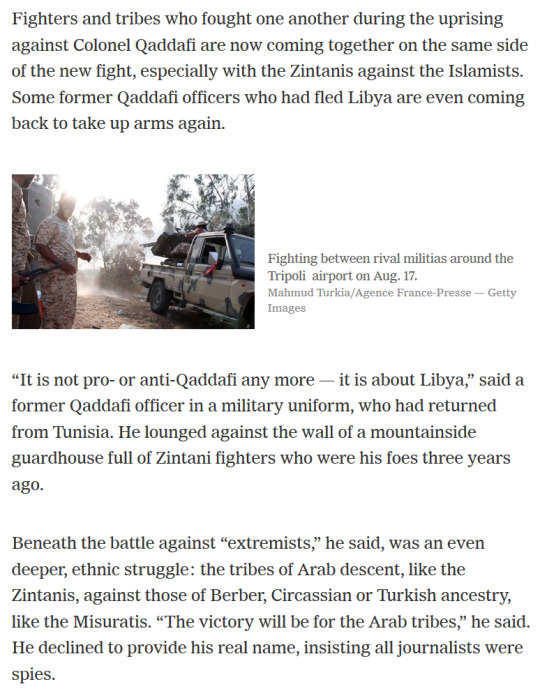
So, the idea of “Islamists from Misrata manipulating power balances in the Tripoli governments” takes on a deeper meaning with ethnic, not just religious contexts (remember, there are salafists in Haftar’s army, but they are ARAB Islamists)
What’s more, with Haftar and the LNA’s recent offensive with Russian backing now threatening the Tripoli power base, suddenly it starts to look like ethnic Turks are under threat of annihilation by an Arab warlord.
So now....
In the last week, Turkey signed a deal with the GNA (Government of National Accord) to be given resource access rights off the north east coast. Now there are rumblings that, besides logistics and munition support they already give to the GNC/GNA, that the Turkish army will intervene and prevent the collapse of the pseudo-turkish power bloc in the north west. Last June, Erdogan threatened Haftar after six ethnic turks were arrested.
It is not beneath Erdogan to continue his neo-Ottoman sphere of influence project into Libya.
So we should be keen to anticipate such a turn of events in Libya. Especially now, since the Turkish intervention in Syria has ground to a halt with the Kurds allying themselves with the SAA.
And of course, all of this is complicated by the fact that Haftar and the LNA’s response has been to ally itself with the state of Greece. HoR and LNA officials have been to Greece to discuss matters already. This folds over quite nicely with a rise in violations of Greek air and naval space by Turkey.
Anyway, this took hours to write
i started at liek 9 adn now it’s 1.....
I hoipe yall are satisfied
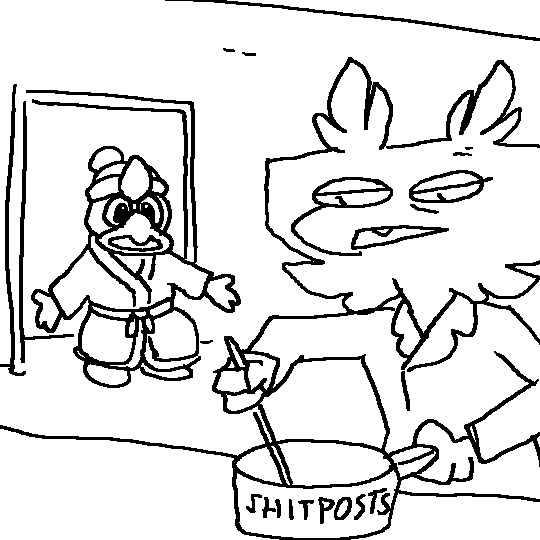
Body of the first article:
Libyan Foreign Minister Mohamed Taher Siala warned of the possibility that retired Major General Khalifa Haftar could enter Tripoli, especially after the recent Russian intervention in Libya.
Siala explained during a press interview that the ongoing escalation in Libya is due to Russian mercenaries’ support to Khalifa Haftar in bombing Tripoli by various means, noting that this matter will lead to civilian casualties and the displacement of thousands of migrants to European shores.
“I live in Tripoli and many believe that it cannot be taken over. However, chaos can worsen the city’s situation, so the public in the city are now asking: Why isn’t the international community that worked to protect civilians in 2011 doing the same now?” added the Foreign Minister.
He indicated that what the Russians say about their support for UN initiatives cannot be taken for granted because the problem lies in Russian prevarication, as Moscow declares a matter and does a completely different matter.
“I think Libya has strategic importance for Russia. They want to tighten their grip on our lands, and perhaps they are working on a strategy that cannot be currently implemented, and that is why their tactics are currently considering the use of mercenaries only,” continued Siala.
For his part, UN Special Envoy to Libya Ghassan Salamé said that “Russian support” for the forces of retired Major General Khalifa Haftar has intensified his attack on Tripoli during the past few days, warning that this may cause a “bloodbath” in the Libyan capital.
Salamé explained that the Russian military forces, who are called “mercenaries or young contractors”, have contributed to changing the strategic balance, pointing out that “since the Russians joined Haftar’s forces, the attack on Tripoli has regained its power.”
“In the last ten days, the war has moved to the urban district of the capital. I do not rule out the possibility of a new deadlock or overwhelming progress,” continued Salamé, stressing that “if this continues, there will be more civilian casualties, more displaced people, and more suffering.”
Salamé did not rule out that the sudden entry of Haftar’s forces to Tripoli would hinder efforts of the preparation for the Berlin International Conference on Libya.
He added that “there will be a bloodbath, a terrible situation of street fighting and indescribable massacres and destruction in the heart of urban areas. It is, therefore, necessary to accelerate things up. The method of dialogue must immediately impose itself to stop the war.”
“In these hours, the fighting has intensified with a number of airstrikes on the Libyan capital. Haftar is advancing,” indicated Salamé.
#libya#misrata#turkey#greece#haftar#khalifa haftar#general haftar#libyan national army#LNA#GNA#government of national accord#house of representatives#libyan civil war#effortpost
35 notes
·
View notes
Link
Poland’s voters will head to the polls on June 28 to vote for their next president, a largely ceremonial position but with crucial power to veto laws. If no candidate draws more than 50% of the vote, a second round will take place on July 12. Conservative incumbent Andrzej Duda, who is allied with the ruling Law and Justice Party (PiS) had been the clear favorite — but in the past month, liberal Warsaw mayor Rafał Trzaskowski of the center-right opposition party Civic Platform, which governed from 2007 to 2015, has shot up in polls.
Poland’s elections are coming down to a choice between the ruling party’s increasing tilt toward autocracy or one that pursues democracy, says Piotr Buras, head of the Warsaw office of the European Council on Foreign Relations. It’s a battle that is playing out across Europe, with the rise of right-wing populist leaders in recent years. “Poland’s future will soon force Europe to confront defining questions about itself,” he says.
How had COVID-19 affected the election?
The election was originally scheduled for May 10 but with four days to go and amid much political wrangling it was postponed due to the COVID-19 epidemic. The Law and Justice Party had insisted that the election go ahead on schedule, and Duda was on a clear path to victory. But the opposition argued that it was impossible to conduct a normal election on public health and logistical grounds. “PiS felt that if they waited longer the chances of Duda winning would get slimmer and slimmer,” says Buras.
In early May, Poland recorded some 300-400 infections a day, reaching a total of some 3,000 cases and 1,400 deaths, according to Johns Hopkins University. Poland has relaxed the lockdown rules since May, allowing people to vote in person. (Postal votes are also available on request).
Who’s leading in the polls?
When the campaign started in February, Trzaskowski, the son of a jazz musician, wasn’t even on the ballot. The election delay allowed his party to replace its struggling candidate Malgorzata Kidawa-Blonska, whose support had dropped in the single digits following a lacklustre campaign. The pro-European Warsaw mayor launched his campaign on May 15, pledging “to fight for a strong state, to fight for democracy.”
April polls predicted Duda would comfortably win a first-round win with more than 50% of the vote. But a June survey by data company Kantar found his support had dropped to 38%, while Trzaskowski scored 27%, up 9% from May. If the two end up facing each other in a runoff Duda is expected lose to the Warsaw mayor, the poll said.
“It was a very lucky situation for the opposition that they had this opportunity to change candidates. And now the race will be extremely tight – 200-300,000 votes might be decisive,” Buras said.
Why did President Andrzej Duda meet with Donald Trump ahead of the election?
The shift has prompted Duda to do what he can to bolster his re-election prospects, for example, by showing off his close ties with Washington. On June 24, he visited President Donald Trump—first foreign leader to meet the U.S. president since February—for discussions focused on security cooperation.
The two leaders have met one on one at least five times, including three times at the White House. Trump once praised Duda as an “exemplary ally” and Duda even offered in 2018 to create a “Fort Trump” that would house U.S. troops in Poland. (That plan has not come into action.)
In a press conference on June 24 Duda promised “build a stronger alliance” with the U.S. while Trump said he believes Duda will be “successful” in the elections. “The people of Poland think the world of him. I don’t think he needs my help,” the president said.
Duda’s visit aligned with “Law and Justice’s campaign strategy to counter the opposition’s narrative that Poland has become isolated internationally under the ruling party. They want to show that Poland is a player on the world stage and close to the U.S., which is seen as the the country’s key military and security guarantor,” says Aleks Szczerbiak, Professor of Politics and Contemporary European Studies at the University of Sussex. But Buras believes the visit will not get Duda many more votes. “This is just confirmation that their candidate is a good friend of America,” he says.
How have LGBTQ rights factored into the election?
As Duda’s campaign struggles, he has ramped up hard-line rhetoric, branding LGBTQ rights an “ideology” worse than communism. In the staunchly Catholic country, a majority of people (66%) oppose same-sex marriage, according to a poll by a research center CBOS in July 2019.
Duda introduced a “Family Charter” among his election proposals earlier this month, including a vow to not allow gay couples to marry or adopt children and to ban teaching about LGBTQ issues in schools. It also seeks to “ban the propagation of LGBT ideology” in schools and public institutions, reminiscent of Russia’s controversial 2013 “gay propaganda” law.
When Trzaskowski became a candidate “the issue of LGBTQ rights became a priority in the campaign,” says Szczerbiak. “It was about mobilizing supporters in small towns and rural areas by raising the stakes for these voters, as well as presenting Trzaskowski as a radical,” he says. “Duda’s message is: unless you vote for me, you’ll have a cultural armageddon,” says Buras.
Trzaskowski — a prominent supporter of LGBTQ rights — has accused the president of fuelling hate. In February 2019, hee signed a declaration pledging support for the LGBTQ community outlining a series of measures, including opening anti-discrimination classes in all Warsaw schools and launching a shelter system for those in need of support.
That prompted a backlash from PiS. A senior PiS official in May posted a tweet with a rainbow flag alongside the Warsaw mayor’s name, saying that he would be “monitoring” him. The Chairman of PiS’s executive committee presented the elections as a choice between “the white-and-red Poland represented by the current president and a rainbow Poland,” in an interview with Polskie Radio in May. The media has also joined in. The pro government weekly magazine, Sieci, featured Trzaskowski on its cover wearing a rainbow armband, with the caption “the extremist candidate” in early June.
But it seems to have backfired, says Szczerbiak. Over the past week “PiS have put the issue on the back burner because it wasn’t mobilizing, it wasn’t succeeding in marginalizing Trzaskowski,” he says.
What are the biggest issues at stake?
Since winning a parliamentary majority in 2015, the Law and Justice party has been able to freely implement its conservative agenda, with Duda’s backing. Similar to the power grab made by Viktor Orban’s nationalist Fidesz party in Hungary, PiS have taken control of core liberal institutions such as the independent judiciary and free press, while increasingly defining national identities in terms of ethnicity and religion and demonising opponents. The government has also backed campaigns targeting independent groups working on women’s, LGBTQ, and migrants’ rights.
“What’s at stake in this election is whether PiS can continue with its radical state transformation,” says Szczerbiak. As the party lacks the three-fifths legislative majority required to overturn a presidential veto, Duda’s defeat would seriously hamper the ruling party’s ability to govern effectively.
Duda’s re-election could allow him to use veto powers and push through controversial judicial reforms, including a new law that would allow judges critical of the regime to face punishment. The reform would essentially enable PiS “to get rid of judges who disagree with the government and its illiberal course, ”says Buras. The E.U strongly condemns the move, with its Values and Transparency Commissioner calling it “destruction” not reform in February, and even brought legal action against Duda’s government for violations of its in October 2019. PiS, however, maintains it is trying to make the judicial system more efficient and eradicate communist-era mentalities.
Citing the E.U.’s proceedings against Poland, Trazkowski has said that his country “ceased to be a leader” in Europe. His campaign pledges to “mobilize the government to give up the conflict with the E.U, institutions and most Member States around the rule of law and ideological disputes.”
If Duda wins, the ruling party “will get further entrenched in the state structures and apparatus,” says Buras. The Polish elections are the site of two battles; against PiS’s authoritarian ambitions and to save “the future of the European project, where democracy itself at risk,” he says. And what prevails, Buras says, is a “matter for Europe as a whole.”
0 notes